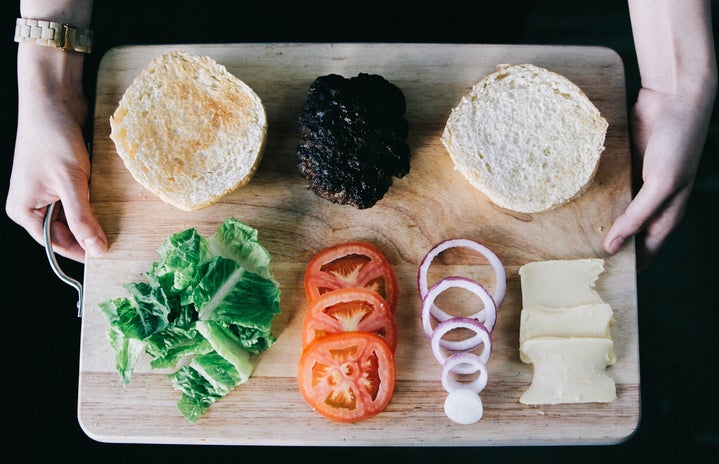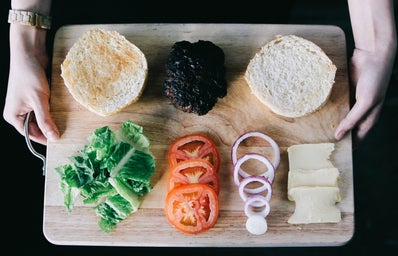In the last article (The Secret to Really Losing Weight), I talked a bit about why dieting doesn’t work for the majority of us and that the term “reasonable routine” is the key to being healthy. In relation to food, there are a few things you need to know; there are a lot of lies out there about eating, and most people (myself included) believe them to be true. However, there’s a bit of a science to eating, both physically and mentally (but it’s super complex, so I’ll only tell you the pieces of what I’ve learned so far). You need to understand how to make both work together to stay healthy.
To make some sense of that, here’s an activity you can try (or imagine you’re trying): grab a straw, and use that to breathe out of; then, start doing jumping jacks, hopping on one leg, or anything that gets your heart rate up while breathing through the straw. Do that for five or ten minutes. After a while, you really need to breathe, right? And then, when you get rid of the straw, you’re taking bigger breaths to make up for what you weren’t taking in. The same thing works with food. Like air, you can restrict yourself on food, but you eventually can’t restrict yourself anymore and, more than likely, you end up overindulging. You weren’t meant to live life completely while breathing through only a straw, and you shouldn’t do that with food. The other catch is that it’s not normal to always take deep breaths or short breaths; you take only as much air as you need, and your body knows exactly how much that is. Food is pretty similar, in that aspect.
With eating,like breathing, the key is to listen to your body and give it what it needs. To explain this without getting too technical about the science behind it, your body has built-in hormones to tell you when it’s full and when it’s hungry. If you eat the right foods and exercise regularly, those hormones work the way they should, and being able to tell when you’re actually hungry and when you’re actually full is a lot easier to do. That’s why it’s so important to eat good foods on a regular basis and exercise often; I promise it’s not just for the sake of annoying people to buy healthy foods and get a gym membership!
And since most people eat more often than they exercise (at least I do), it’s crucial that you use food as something that will keep your body working normally rather than using food as a filler for boredom, emotion, etc. I know it’s been said a million times, but eat your fruits and vegetables! Eat more lean protein than fatty protein, less processed foods, and foods filled with added sugars and fats. If you’re going to fuel your body, you need to fill it with things that it knows how to break down and utilize. Like I said, these are words that you’ve probably hear a billion times, but they are so true. Your mom actually had a point when she was telling you to eat your broccoli (even though the only way mine got me to was by saying that my eyes would turn green, which they didn’t; but whatever works, right?).
With that being said, here are a few food tips:
-Snacks can easily add a LOT of extra fat, sodium, etc. to your diet! Switch chips for almonds, carrots, grapes (a non-processed snack that you enjoy).
-When eating meals, take. your. time. It takes about twenty minutes for your stomach to realize it’s full (and again, your body knows how much it needs), so you should focus on the food you eat rather than eating mindlessly. If you don’t pay attention to how you feel when you’re eating, you tend to eat a lot more than your body needs. Stay away from distractions (social media, Netflix, etc.), so you can focus on your food and notice when you’re full. Have a good chat with friends, have water or another beverage to drink in between bites, and enjoy your meals! Food’s too good to eat fast.
-I know I’m the billionth person to say this, but stop drinking soda, Starbucks, sweet tea, and anything that’s only giving your body sugar and calories! Look at the nutrition facts in anything that’s not water, or milk, or a 100% fruit/veggie drink; there’s way too much added sugar, sodium, or preservatives that your body does NOT need.
-Colorful plates are key: a balanced meal should consist of about three or more food groups. Everything is good in its own moderation, so don’t skip out on breads or cheeses because you read that they’re “bad”; eat them in moderation with other foods! For example, instead of just eating mac n’ cheese (a personal favorite), have one part mac n’ cheese with one part broccoli and a half part of turkey sausage. With a bowl of cereal and milk, add a banana.
– I know you’ve definitely heard this one, but portion sizes really are a big deal. If you take your time eating, have a variety of foods to eat, and drink a good amount of water throughout your meal, it’s easier to have regular portion sizes and feel satisfied.
-And never, ever, EVER skip meals. Don’t do it! Maybe it seems like a good idea to cut down the calories, but it’s just throwing your body off of its routine. When you start skipping meals, your brain sends out signals that tell your body to save the fats and sugars that it’s being fed (because it doesn’t know if or when you will eat again) instead of letting your metabolism burn it off. Skipping meals does more harm than good, I promise!
This article is a bit longer, but I cannot stress enough how important food is. The need to eat is partially psychological, but what you eat is what shows physically; you need to feed yourself, you should eat things that your body will actually use, and you have to be conscious about the food you eat. If you need help thinking of healthy meals with a variety of food groups, look here. Use Google and Pinterest to your advantage; healthy meal planning is tough on your own! If your food comes from the caf, look for foods that your body will thank you for. Eat with a purpose and enjoy it. Bon apetit!

